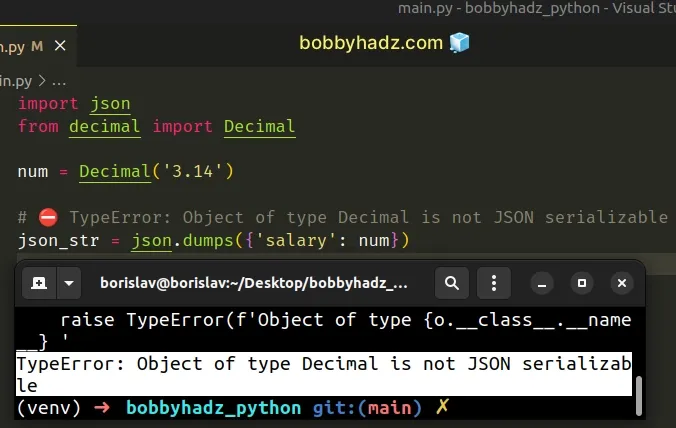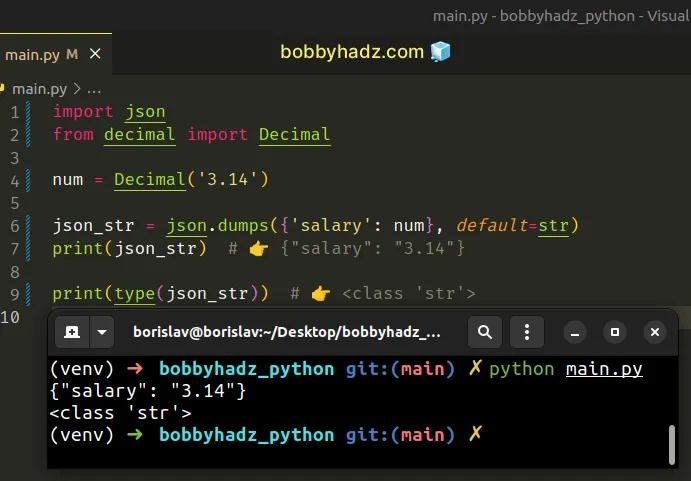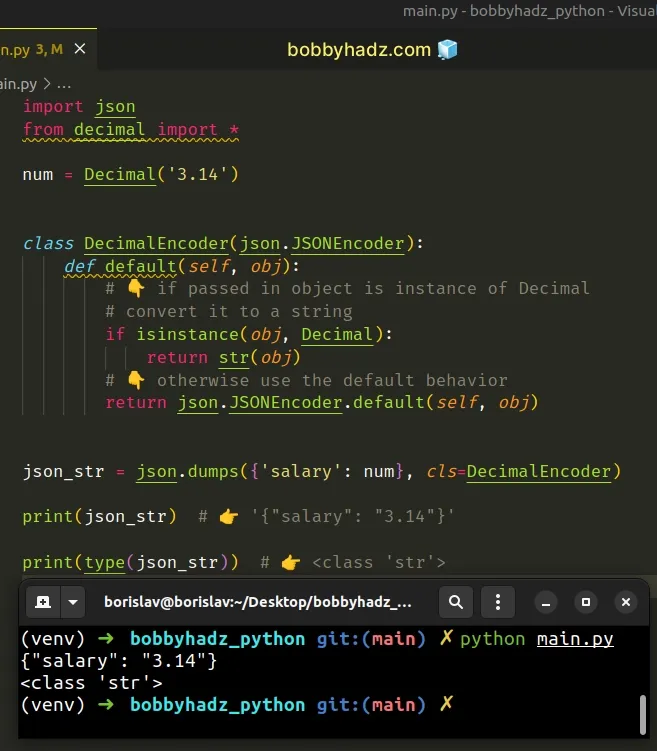TypeError: Object of type Decimal is not JSON serializable
Last updated: Apr 8, 2024
Reading time·3 min

# TypeError: Object of type Decimal is not JSON serializable
The Python "TypeError: Object of type Decimal is not JSON serializable" occurs when we try to convert a Decimal to a JSON string.
To solve the error, extend the JSONEncoder class and convert the decimal to
a string to preserve its precision.
Here is an example of how the error occurs.
import json from decimal import Decimal num = Decimal('3.14') # ⛔️ TypeError: Object of type Decimal is not JSON serializable json_str = json.dumps({'salary': num})

We tried passing a Decimal to the json.dumps() method but the method doesn't
handle Decimal values by default.
# Use the default keyword argument to solve the error
One way to solve the error is to use the default keyword argument in the call
to the json.dumps method.
import json from decimal import Decimal num = Decimal('3.14') json_str = json.dumps({'salary': num}, default=str) print(json_str) # 👉️ {"salary": "3.14"} print(type(json_str)) # 👉️ <class 'str'>

The json.dumps() method converts a Python object to a JSON formatted string.
default keyword argument can be set to a function that gets called for objects that can't otherwise be serialized.We simply convert the Decimal object to a string by passing it to the str
class.
# Create a custom DecimalEncoder to solve the error
An alternative way to solve the error is to extend from the JSONEncoder class
and convert Decimal values to a string when serializing them.
import json from decimal import * num = Decimal('3.14') class DecimalEncoder(json.JSONEncoder): def default(self, obj): # 👇️ if passed in object is instance of Decimal # convert it to a string if isinstance(obj, Decimal): return str(obj) # 👇️ otherwise use the default behavior return json.JSONEncoder.default(self, obj) json_str = json.dumps({'salary': num}, cls=DecimalEncoder) print(json_str) # 👉️ '{"salary": "3.14"}' print(type(json_str)) # 👉️ <class 'str'>

The json.dumps() method converts a Python object to a JSON formatted string.
We extended from the JSONEncoder class.
The JSONEncoder class supports the following objects and types by default.
| Python | JSON |
|---|---|
| dict | object |
| list, tuple | array |
| str | string |
| int, float, int and float derived Enums | number |
| True | true |
| False | false |
| None | null |
Notice that the JSONEncoder class doesn't support Decimal to JSON conversion
by default.
We can handle this by extending from the class and implementing a default()
method that returns a serializable object.
import json from decimal import * class DecimalEncoder(json.JSONEncoder): def default(self, obj): # 👇️ If the passed in object is an instance of Decimal # convert it to a string if isinstance(obj, Decimal): return str(obj) # 👇️ otherwise use the default behavior return json.JSONEncoder.default(self, obj)
if statement, we check if the passed-in object is an instance of the Decimal class and if it is, we convert it to a string and return the result.In all other cases, we let the base class's default method do the serialization.
To use a custom JSONEncoder, specify it with the cls keyword argument in
your call to the json.dumps() method.
# ✅ set cls kwarg json_str = json.dumps({'salary': num}, cls=DecimalEncoder)
If you don't provide the cls kwarg, the default JSONEncoder is used.
# Using the simplejson module to solve the error
An alternative way to solve the error is to use the simplejson module.
You can install the module by running the following command from your terminal.
pip install simplejson # 👇️ or pip3 pip3 install simplejson

The simplejson module has native support for Decimal values.
from decimal import Decimal import simplejson as json num = Decimal('3.14') json_str = json.dumps({'salary': num}) print(json_str) # 👉️ {"salary": 3.14} print(type(json_str)) # 👉️ <class 'str'>
Notice that we imported simplejson and aliased it to json.
The dumps method from the simplejson module has native support for Decimal
values, so we don't have to handle the conversion in any way.
The dumps function optionally takes a use_decimal keyword argument.
from decimal import Decimal import simplejson as json num = Decimal('3.14') json_str = json.dumps({'salary': num}, use_decimal=True) print(json_str) # 👉️ {"salary": 3.14} print(type(json_str)) # 👉️ <class 'str'>
If the use_decimal keyword argument is set to True, then decimal.Decimal
is natively serialized to JSON with full precision.
The default value of use_decimal is True.
# Additional Resources
You can learn more about the related topics by checking out the following tutorials:
- Add zeros to a Float after the Decimal in Python
- Format number with comma as thousands separator in Python
- Count the decimal places of a Float in Python
- Remove the Decimal part from a Float in Python
- How to Remove the trailing Zeros from a Decimal in Python
- Round a Float to 1, 2 or 3 Decimal places in Python
- Split a Float into Integer and Decimal parts in Python
- SyntaxError: invalid decimal literal in Python [Solved]

